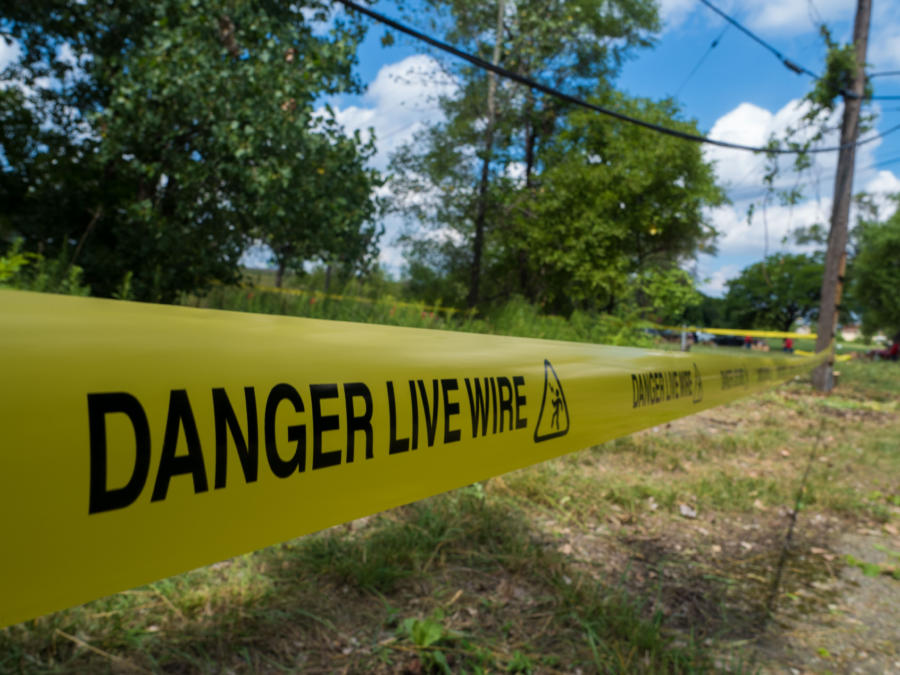Since its discovery in 1879, electricity has woven its way seamlessly into our society, providing unprecedented power and efficiency to our lives. We now use it to light our homes, charge our electric vehicles, cook our meals, stream our favorite shows, and check what our aunt Debra is doing on Facebook.
However, the safe and frequent use of electricity can sometimes make us lose sight of the potential dangers and hazards that it generates. Whether you realize it or not, you’re around electrical equipment, and possible electric safety hazards, every day. With warmer temperatures upon us, we know you’re itching to get outside to work or play. But before you do, read these safety practices so you’ll know how to safely act around common electrical equipment and hazards.
Outdoor Electrical Safety
Power Lines
Power lines stretch across our neighborhoods, carrying electricity from power plants and substations to businesses and residents. They play an integral part in providing the power we need for everyday life. However, transmitting high amounts of electricity gives them the ability to do significant damage. To keep you and your family stay safe, make sure to:
- Always stay at least 20 feet away from power lines at all times
- Never use a metal ladder when working anywhere near power lines. Metal is conductive and can seriously shock or electrocute you if it comes in contact with electricity
- Avoid carrying tools, and things like rakes and pool skimmers, above your head when near power lines. It’s easy for them to get tangled and cause harm to the wire, or even worse, yourself
- Find out where power lines and other utilities are buried before you install a fence, deck, mailbox, lamppost or any other outdoor home improvement project. A simple phone call to MISS Dig at 8-1-1 is all it takes.
- Teach your children to not climb trees, fly kites or play with any other toys near power lines
If you do come across a downed power line, stay at least 20 feet away from it and anything that it may be touching. Once you’re in a safe location, the best thing you can do is report the downed power line to DTE by calling us at 1.800.477.4747, or via our website dteenergy.com/reportoutage or mobile app.
Metal Utility Boxes
When planting flowers, or doing other yard/gardening work, make sure you leave eight feet of clearance in front and two feet on all other sides from the green or gray metal box commonly found in front, side, or back yards. That box is used for underground wiring and should not be sat on, tinkered with or touched.
Tree Planting or Trimming
If you’re thinking about planting a new tree, please reference our Right Tree, Right Place guide to help you make the safest decision for yourself and our power lines. If you’re planning on trimming any trees, we recommend contacting a professional tree-trimming service to complete the work. Overhead power lines that run near trees carry high-voltage electricity that can seriously or fatally injure you.
Indoor Electrical Safety
Plugs, Cords, and Fuses
It’s important to not overload the plugs and fuses in your home, and to regularly check to make sure cords aren’t damaged or frayed. Both can become electric fire hazards if not routinely checked. A few other tips include:
- Only plugs or plug guards should be placed in any outlet. Be sure outlets near wet areas of the kitchen, bath and laundry room have GFCIs (ground fault circuit interrupters) to prevent serious shock injuries
- To prevent damage to cords, pull by the plug, not the cord when unplugging an appliance or tool
- Never use anything other than a fuse to replace a fuse. Make sure the replacement fuse is the correct amperage
- Always unplug an appliance or tool before cleaning, adjusting or repairing it
Electrical Shock or Fire
Avoiding electrical shocks, or fires, starts with knowing how to reduce their risks of happening. Start by:
- Never mix electricity and water. Never step into a flooded area if water is in contact with electrical outlets, appliances, or cords. Don’t use electrical appliances or touch circuit breakers or fuses when you’re wet or standing in water.
- Limit the number of appliances plugged into each outlet. Don’t exceed the recommended wattage when replacing bulbs in lamps, light fixtures or holiday lighting
If you do find yourself dealing with an unfortunate electrical shock or fire situation, try to remember to:
- Never touch a person who is being shocked. If you can do it safely, unplug the appliance or turn off the power. Call for medical help immediately and begin CPR after the victim is cleared from contact
- Never throw water on an electrical fire. If you can do it safely, turn off the power or unplug the appliance
Following these safety practices, and passing them on to those around you, will greatly benefit your safety. They will allow you to focus on all the life-changing benefits of electricity, and none of the safety hazards.
